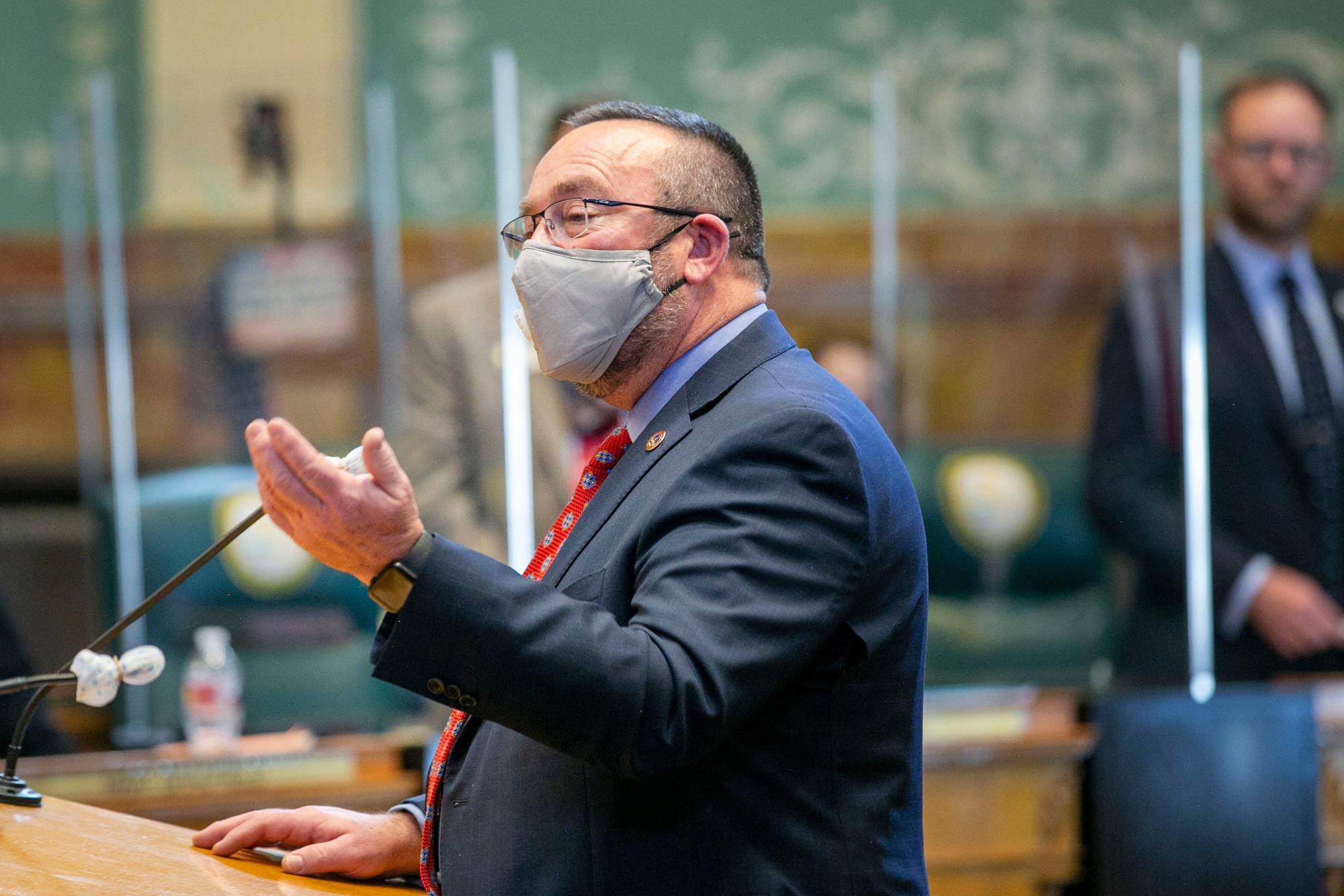
Hugh McKean just took one of the toughest jobs in Colorado politics.
The unassuming 53-year-old general contractor and homebuilder is the new minority leader for Republicans in the state House, where the party has been pushed to the edge of irrelevance by years of election losses.
Now, with the party divided nationwide by the fall of former President Donald Trump, McKean will test whether a return to a Reagan-style message and a willingness to compromise could help the GOP find its footing in Colorado.
“I think what the state often needs is less ideology and more practicality,” said McKean, who represents Loveland in Northern Colorado. “It all falls somewhere right in the middle.”
Before he can take on Democrats, McKean will have to unify a caucus that has shrunk to just 24 of 65 seats in the House, and which mirrors the same splits facing the larger party.
The job ahead of McKean is “hugely important,” said Brian DelGrosso. The former Republican representative from Loveland served as minority leader until 2017.
“They need to go out and make a case to the people of Colorado that Republicans have a viable vision, a viable path and outlook for the future,” DelGrosso said.
A More Moderate Image
McKean replaces Rep. Patrick Neville, the divisive but well-connected lawmaker who led the caucus from 2017 to 2020. Neville kept a tight circle of allies in the caucus and battled Gov. Jared Polis over pandemic restrictions over the last year. In leadership elections held last November, McKean beat out two other contenders for the minority leader position.
The new minority leader has cut a more moderate public image.
He has not publicly questioned the validity of election results or flouted pandemic restrictions, as Neville and other House Republicans have. During his four years in the legislature, he has successfully sponsored dozens of bipartisan bills on topics like water use and emergency response.
He talks often about conservative fundamentals — individual rights, small government, free enterprise — but he doesn’t spend much time arguing on Twitter or passing doomed “message” bills.
“I think that he’ll be more successful as a leader by not being the person that's out there on social media and throwing bombs all day long,” DelGrosso said.
However, the first days of the session cast a shadow over McKean’s relationship with Democratic leaders. Some House Republicans broke longstanding tradition by fighting Democrats over chamber rules and contesting the selection of the new Speaker of the House.
“I think that first day of session was a good example of one where he really had trouble kind of putting the institution first, ahead of allowing the right wing of his caucus to really bully him,” said Rep. Alec Garnett, the Democrat who is the new Speaker.
“So, I wish him the best success. My door's always open. We talk a lot, but, you know, it's unclear exactly how it's all going to go for him.”
From Missouri To Loveland
McKean was born in Bucks County, Pennsylvania, but his family’s life took a sharp turn when his parents quit their suburban teaching jobs and moved to a farm in rural Missouri when he was 7 — an experience that he called formative.
“You have to learn how to fix things, diagnose things,” McKean said. “Farm kids have to know a lot of stuff.”
A divorced father of two young adult children, McKean lives today in Loveland. He graduated from Colorado State University with a liberal arts degree and is a member of the Coast Guard Auxiliary, which he joined in the aftermath of Sept. 11.
McKean was first elected to the Loveland City Council in 2009, having been drawn into politics by his service on a charter school board. He joined the state legislature in 2016, and has quietly built his influence in the years since.
“I came into the legislature in 2017 and really noticed a lack of mentorship, a lack of ability, a lack of resources for new members to get going, to get started,” he said.
Even worse, he said, the party needed to do a better job of “telling the story of what being a Republican means in the state of Colorado.”
But what that story means is an open question for Republicans right now.
A Split In The Party
First-term Congresswoman Lauren Boebert has recently become a national media figure by engaging in the kind of hyper-partisan online warfare that McKean avoids. Members of his own caucus have stoked suspicions about election integrity, while McKean has downplayed those same conspiracy theories.
Lois Landgraf, a longtime ally of McKean and former GOP representative, said that he’ll have to play the role of “peacekeeper” in a party that’s developed a divide between “the far right members and the more moderate members.”
She added: “I think the party needs to go back to where it used to be, where, No. 1, we accept all Republicans. I get tired of the name calling.”
McKean hasn’t shied from conflict within the party. Not long after winning the election to replace Neville, he criticized the former leader for tweeting out the personal information of a Denver Post reporter. But he also said that he won’t be strictly policing the bills that his members introduce to keep them away from inflammatory issues, such as last session’s short-lived effort to ban same-sex marriage.
“I think that’s one of the social issues bills that becomes a message bill for a very small group of Republicans. I don’t know a lot of Republicans that are interested in dealing with the social issues,” he said. “I think that what we're very much more concerned about right now is the issue of what health care looks like in rural counties.”
Record Of Compromise
McKean has a successful track record with his own legislation. He was a sponsor of 36 bills that became law in the last two years, and only 11 that failed, according to an analysis by Colorado Capitol Watch.
The vast majority of his bills had a Democratic cosponsor, unsurprising given his record of success getting through a process controlled by that party. There were only a few apparent “message” bills: One of McKean’s failed proposals would have restored harsher punishments for certain drug offenses, while another would have required traffic signals to add a yellow signal between red and green.
On the opposite side of the aisle, some Democrats expect McKean to take a similar approach to leadership — with more of a focus on smaller legislative wins than grand, losing battles.
“Some of his caucus is going to want to be fighting all the time against the Democrats, some are going to want to find compromise,” said former House speaker K.C. Becker. “Generally, Hugh is willing to come into the Speaker’s office and say, ‘Here’s what my side wants.’”
Despite his easy demeanor, McKean talks about Colorado as a state divided. It doesn’t come out in the form of life-or-death fears about a looming Left, which have become commonplace in much conservative rhetoric.
Instead, McKean describes a “culture war” on the more mundane topics that have long been central to political debate here — like water, or taxes, or transit — where he sees his opponents trying to engineer changes that leave out constituents outside the fast-growing Front Range.
“When we talk about the diversity of thought, it’s far less the ideological diversity. It’s the practical challenge of what does life on the Western Slope look like?” he said. “What does life in the northwest corner of the state look like, compared to the Front Range corridor?









